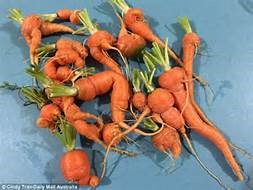It all started with an article on the truth about “baby carrots.”
You know, those adorable bright orange, perfectly-shaped little carrots that seem so healthy. They look great on an appetizer platter and are so much easier than cutting odd-shaped unwieldy carrots. Carrots that grow hair … those annoying spindly threads that start sprouting as soon as you bring them home.
I was always so proud of myself for choosing a baby carrot over a candy bar or pint of Ben and Jerry’s. That is … until I read the article on baby carrots.
You see, there’s no such thing as a baby carrot. They are made from “deformed” carrots. Carrots that are rejected because they don’t look perfect. Because they’re gnarly, crooked, or blemished, they are sold and re-shaped into perfectly formed “baby carrots.” And, to keep them looking good and to eliminate any unwanted bacteria (or spindly hair), they are washed in chlorine, similar to what’s used to clean a pool and other chemicals, some of them known carcinogens, only they’re FDA approved.

Really? While I was suspicious about the FDA approval process, I started contemplating about the “need” for baby carrots.
As many of you know, I write and speak about corporate culture. So what do baby carrots have to do with culture?
How We Do Things Around Here
Culture is defined as: “How we do things around here.”
And I’m realizing that we have a societal culture that says that our food must look good and be convenient or we won’t buy it or eat it. That’s how we do things in America.
I know this first hand because for many years, I would glean vegetables that were deemed unacceptable by the canning companies. Growers, (usually Mennonite farmers,) would invite us to pick the “unacceptable” vegetables that were left behind after harvest. We would pick the remaining healthy vegetables that would then be delivered to food pantries. On scorching summer days, I picked tomatoes, corn, squash, peppers, and watermelon. Trust me. There was nothing wrong with these vegetables, other than a surface blemish or odd shape.
I began to think about how we would rather consume food that is laden with chemicals because it’s pretty or convenient.
“I just don’t have time to chop carrots.” “I have better things to do with my time.” “It’s boring. Tedious.”
Are we really that superficial? Are we so busy that we’d rather eat something that is convenient, looks perfect and is laden with chemicals than take a few minutes to chop a forlorn, “deformed” carrot?
But Wait! There’s More!
Just as I’m working myself into a full rant about baby carrots, I read an article about how cereal manufacturers are returning to the practice of putting chemical dyes into our cereal. Why are they returning to red, blue and yellow dye? Because kids don’t like the way it looks and won’t eat it. And the sugar levels are being increased because it tastes better.
AAARRRGGGHHH.
5 year olds are determining the health of the nation.
Little Bella won’t eat it because it’s not pretty. Little Connor doesn’t like how real food tastes.
Mom and Dad are so stressed trying to balance work, soccer practice, piano, ballet, the gym and yoga that they push the Easy Button when it comes to food. McDonalds, Wendy’s, Dominos… baby carrots and Fruit Loops.
Anybody who’s traveled to Europe knows that the “American food” made for Europe doesn’t contain any of the crap that is in our food. They won’t eat it and many countries won’t allow it.
And this diatribe doesn’t even take into account that many Americans live in food deserts, with limited access to real food. They are forced to buy packaged, chemical and sugar laden food at the 7-11.
Call to Action
My request, and call to action, is not that you become an organic vegetarian or vegan or food vigilante.
I ask that you make informed choices that are consistent with your values about your health and wellbeing and the wellbeing of the people in your communities.
I ask that you stop making excuses about being too busy to eat healthier foods.
I ask that you stop making excuses about not being informed because reading or listening to the news is so negative.
Please – Start being accountable for “how you do things around here” in your family and community.
Please – Start making informed choices that reflect your values.
Please – Start being responsible for knowing what legislators and manufacturers are doing to our food.
If you’re not willing to take action, consider this:
We teach our kids to respect and value people who look different. It may sound silly, but why don’t we do that with our produce?
We teach our kids to avoid drugs and protect them from harmful substances. So, why do we feed them foods loaded with chemicals?

Marty Stanley is a Certified Speaking Professional
Nationally recognized award winning executive coach
www.alteringoutcomes.com martystanley@alteringoutcomes.com
816-695-5453 or 858-432-6764










Excellent post, Marty! Appreciate the call-to-action and thought-provoking close.
I believe there are simple reasons we eat “convenient” foods and insist on perfect produce. First, we are rewarded for our “busyness” and have bought into the notion that we (and by extension our kids) are successful when our days are packed to the gills with activity. Downtime and time to daydream or think is in short supply as we push to achieve more in every 24 hours. (Also is the reason we don’t get enough sleep.) Who has time to cook from scratch any more? And when we do, doesn’t it have to be Instagram-worthy?
Our need for perfect produce results partly from the fact we are far removed from food production. Only 2 percent of the U.S. population is engaged in farming, which means many of us have never visited an orchard or seen sweet corn in the field. We demand and consume produce that’s out-of-season because we don’t mind the fact it’s shipped long distances to our neighborhood supermarket. I bought watermelon three or four weeks ago, although watermelon won’t appear at my local farmer’s market until July.
Thanks for letting me share my thoughts.
Thanks Jenell, for your thoughtful comments!